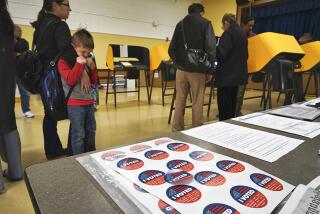Suit may spur greater Web access for blind
- Share via
A ruling by a judge in San Francisco could mean that businesses would have to make their websites accessible to the blind, something disability rights advocates say is vital as the routine transactions of everyday life take place more and more on the Internet.
U.S. District Judge Marilyn Hall Patel granted class-action status Tuesday to a lawsuit alleging that Target Corp. is in violation of California law and the Americans With Disabilities Act because screen-reading software doesn’t work on parts of its website, essentially making it unusable for blind people.
Many retailers, including Wal-Mart Stores Inc. and Amazon .com Inc., and most big banks have upgraded their websites or are in the process of doing so, said John Pare Jr., executive director of strategic initiatives for the National Federation of the Blind, which sued Target last year.
The suit says that Target hasn’t implemented “technologically simple and not economically prohibitive” code into its site that would allow the software to vocalize all the site’s content.
Making a site more accessible can include tagging images with word descriptions, allowing the software to “read” those images aloud.
Target said in a statement that its online business had made “significant enhancements to improve the experience of our guests who use assistive technologies.”
The company, based in Minneapolis, said it would request an immediate review of the judge’s ruling.
Patel, noting in her ruling that this is “an age when commerce is increasingly conducted on and through the Internet,” certified a federal class, allowing blind people across the country who have tried to access Target .com to become plaintiffs.
She also certified a separate class made up of California residents with the screen-reading software. The lawsuit says about 10,000 people in California use reading software to access the Internet.
“A lot of people on both sides have been waiting for this decision because it’s implications are so far reaching,” said Larry Paradis, executive director of Disability Rights Advocates, a Berkeley-based public interest law firm that represents the federation.
If the federation wins, he said, the implications will be sweeping for many website operators, including online university programs and trade schools as well as supermarkets and social networking sites.
Right now, to many retailers, there is confusion about what to do to comply with the Americans With Disabilities Act and with California’s disability accommodations law, said Mallory Duncan, general counsel of the National Retail Federation, a Washington-based trade group.
“The federal government has never issued regulations that have addressed this issue for individual companies,” he said. “To a large extent, the companies too are flying blind.”
Accessibility has become important as people are increasingly directed to the Web to find information or apply for jobs or benefits. And the ability to shop, pay bills and perform other tasks on the Internet is “especially important” to the visually impaired, whose mobility is limited because they can’t drive, said Eve Hill, executive director of the Disability Rights Legal Center at Loyola Law School in L.A.
The Web is the “new front door to the public,” said Douglas Towne, a public policy facilitator for Accessing Digital America, a Florida-based nonprofit advocacy group. But, he said, most of the 24,000 federal, state and local government sites aren’t easy for the visually impaired to navigate.
Making the necessary fixes, he said, isn’t expensive. “It’s more a matter of thought.”






